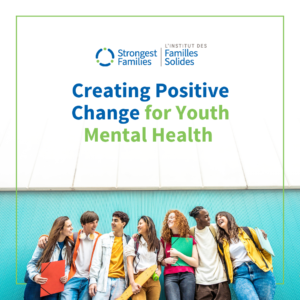The Youth Mental Health Crisis
Youth mental health in Canada is in crisis. Nearly 3 in 5 young people aren’t getting the support they need to manage anxiety, depression, and other challenges. This lack of support can lead to struggles in school, strained relationships, and lost opportunities.
One of the most alarming findings from recent research is that youth with more than six hours of screen time daily are 2.5 times more likely to report high anxiety. These numbers are more than statistics—they’re a call to action.
In consultation with the mental health community, Bell Let’s Talk partnered with Mental Health Research Canada to prepare the comprehensive national report, A Generation at Risk: The State of Youth Mental Health in Canada. Released in October 2024, the report uncovers alarming statistics about Canada’s growing youth mental health crisis.
More Youth Mental Health Support is Needed Now!
When and How to Support Youth
Recognizing when a young person needs help is key to supporting them early. Signs of anxiety and depression can include:
Anxiety
- Feeling nervous or overwhelmed most of the time.
- Avoiding activities, school, or people they used to enjoy.
- Physical symptoms like headaches, stomach aches, or trouble sleeping.
- Feeling unable to relax, even when they try.
Depression
- Feelings of sadness/low mood, hopelessness or emptiness, anger or easily frustrated/irritable, low self-esteem or worthlessness,
- Loss of interest (or pleasure) in usual activities, loss of interest in (or conflict with) family and friends
- Trouble thinking or concentrating,
Changes in eating (overeating or restricting) and/or sleeping (too much sleep or difficulty getting and staying asleep
Starting the conversation is often the hardest step. Talking to a trusted person, whether it’s a parent, friend, teacher, or counsellor can be a great first step.
Early intervention is critical because it teaches young people how to manage their well-being and build skills that can last a lifetime.
Read our Tip Sheet on recognizing the signs and getting help below.
How Strongest Families Can Help
At Strongest Families Institute, we know that asking for help can feel overwhelming. That’s why we make it easy with our, tailored anxiety programs to meet youth where they are—on their schedule and at their comfort level.
Dr. Patricia Lingley-Pottie, President and CEO of Strongest Families Institute, says:
“Early intervention saves lives. By equipping youth with tools to manage their mental health, we’re helping them thrive, not just survive.”
Our programs are free, evidence-based, and designed to empower youth and families to overcome challenges together. We offer convenient phone appointments so no need to worry about missing school or work to attend a coaching session.
Whether it’s learning to manage anxiety or finding ways to reconnect, Strongest Families is here to help.
We offer Youth Mental Health Support for free with no waitlists!
Take the First Step Today
If you or someone you know is struggling, don’t wait. Early support can make all the difference. Learn more about our programs and how we can help https://strongestfamilies.com/get-help-now/
Together, we can create positive change in youth mental health


